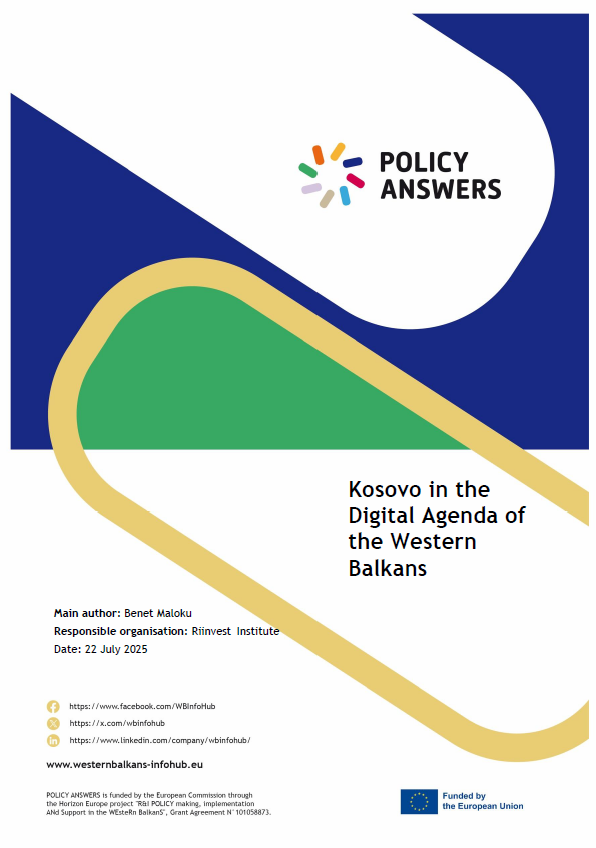This POLICY ANSWERS Brief was published in July 2025 by Benet Maloku and his contributing authors Muhamet Mustafa, Alban Hashani, Bujar Pira and published by the Riinvest Institute. This report addresses the issue of the implementation of the Digital Agenda in Kosovo.
The European Union (EU) Digital Agenda, launched in 2010, aims at accelerating the digital transformation of the European economy by developing digital infrastructure, advancing public services and supporting the digital transformation of businesses. It also aims at enhancing cybersecurity and creating a digital single market that will enable innovation and healthy competition. A derivative agreement of the EU’s Digital Agenda is the Digital Agenda for the Western Balkans (WB). As part of this agenda, Kosovo* has taken significant steps to implement these objectives by adopting laws and strategies aligned with EU standards, as well as undertaking concrete activities in the areas of infrastructure, digitalisation of public services and the digitalisation of processes.
Although Kosovo has made progress in areas such as governance, connectivity and digital education, it still faces several major challenges. These primarily include improving the digital skills of citizens and public administration officials, as well as continuing the digitalisation of public services. Furthermore, there is an immediate need to overcome chronic issues regarding the advancement of health information systems. On the other hand, the development and advancement of digital services in the education sector remains one of the key priorities. At the regional level, in terms of connectivity, Kosovo stands among the WB economies with the highest number of broadband connections and a high positive perception of reduced roaming costs. Additionally, concerning the adoption of laws in the fields of connectivity, digital identity and cybersecurity, Kosovo is aligned with EU regulations.
In a research study conducted by the Riinvest Institute in 2022 with enterprises in the manufacturing sector, it was found that enhancing digital skills among management and workers was crucial for the further progress of businesses. This reaffirms the importance of possessing these skills for the workforce. Properly addressing the enhancement of digital skills, along with improving digital infrastructure, will not only help improve the quality of public services but will also contribute to strengthening Kosovo’s integration in the region and the EU market.
Future research should focus on monitoring Kosovo’s progress in integrating and implementing new technologies, such as the application of “Big Data”, “Cloud Systems”, and “Artificial Intelligence” as well as digital skills development as part of important processes.
Taking into account the findings of the report, the authors recommend the following:
- Further expansion of the 5G network and simplification of procedures for the deployment of 5G supporting infrastructure.
- Expansion of public services provided on the e-Kosova platform, thus broadening the range of online services and further integrating them into the interoperability platform of state institutions. Additionally, increasing the promotion of the digital services offered on e-Kosova to citizens.Regular publication of open and updated data from institutions on the open data portal.
- Providing training programmes for public officials on the use of new technologies and expanding support for digital skills development through awareness-raising initiatives.
- Updating and aligning the curricula of public and private universities with the demands of the labour market in the Information and Communication Technology (ICT) industry.
- Publishing updated data on developments in the ICT sector in Kosovo, including the number of graduates from this sector entering the labour market, the number of ICT specialists, the level of adoption of new technologies by businesses (Big Data, Cloud and Artificial Intelligence (AI)) and eCommerce trends.
- Operationalisation of the National Health Information System through the integration and further development of its constituent systems.
- Aligning Kosovo’s legislation with the EU directives on open data and cybersecurity legislation with the EU’s NIS2 directive

